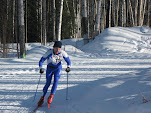Equinox Marathon T - 22 Days
I have been preparing for the Equinox since late June, and with only three weeks to go, all seems well. As more of a middle distance and semi-long distance runner, the marathon is somewhat beyond my comfort zone. These days I feel fairly confident racing anything from the mile through maybe 30 kilometers, but beyond that is a gamble. Nevertheless I've done the work, or as much as feasible and have averaged about 65 miles a week since June, not quite as much as I'd hoped for, but it's a solid running base on top of the cardiovascular volume
 accumulated during ski season. More importantly, I have been able to put in the requisite long runs throughout the summer, and by the time I start my taper in a week, I'll have logged in about eight or nine runs of 15 miles or more, including several 20 - 21 milers. In addition, I've run another eight or ten 12 to 14 mile efforts, and most of these include several miles at marthon pace or faster.
accumulated during ski season. More importantly, I have been able to put in the requisite long runs throughout the summer, and by the time I start my taper in a week, I'll have logged in about eight or nine runs of 15 miles or more, including several 20 - 21 milers. In addition, I've run another eight or ten 12 to 14 mile efforts, and most of these include several miles at marthon pace or faster.It's hard to compare Equinox times and those from a flatter road marathon, but the course appears to be 15 to 25 minutes slower (depending on your pace) for those who would normally run 3 hours or faster on a relatively fast course such as New York, Boston, or Chicago. The course record is 2:41 for men and 3:18 for women. The 3:00 barrier has only been broken 53 times by about 25 men. At this point, I'd be most thrilled to challenge the master's record of 2:58, set in 1988 by Frank Bozanich. That would be a tall order. A more realistic standard would be to aim to break 3:05. If I can manage the downhills without breaking down, maybe a few minutes under that. If the weather is poor, or if I just don't have it on that day, a couple of minutes slower would still be acceptable. Anything slower than 3:10 would be disappointing.
This will be my 2nd attempt at Equinox. In 2004, our first year in Alaska, I ran a train-delayed 3:12:24 (a freight train passed through the course at mile 8, which delayed me and two other runners by 2 or 3 minutes). At the time I was listed in the archives as the course record holder for age 46, but alas they've found that someone ran 20 seconds faster back in 1982. I should appeal for an asterisk due to the train delay, but that would probably be met with derision and ridicule. I'll just have to make up for it in a big way this year.
Stay tuned for pictures and stories.


1 Comments:
what did your final time wind up at? I ran my first marathon during the equinox '06, in 5 hr. 55 sec. I am hoping to come back and do 4 hr. even, give or take. Was life changing...:)
Post a Comment
Subscribe to Post Comments [Atom]
<< Home